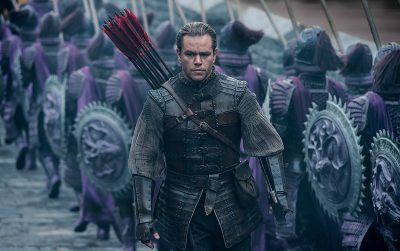
“The Great Wall” is one of those movies where no matter how few expectations you have going in, it’ll manage to bring them down even lower. This isn’t even because of the supposed controversy surrounding it — according to director Zhang Yimou, Matt Damon’s casting as the main character of the movie, along with Pedro Pascal and Willem Dafoe, were solely to better market the movie for an overseas audience such as the United States. It’s simply because this movie tries too hard to be an average blockbuster when, instead, it ends up being just average.
The film’s plot is a little all over the place. The main character is, supposedly, William (Damon), a mercenary of no discernible origin except maybe “White European,” gets captured alongside his fellow mercenary friend Tovar (Pascal) by the Nameless Order, the guards of the Great Wall of China. There, they discover the wall is about to be sieged by the Tao Tie, monsters that care only about eating humans. William and Tovar stick around to help Commander Lin (Tian Jing), Strategist Wang (Andy Lau) and General Shao (Hanyu Zhang) to stop the Tao Tie from going over the Wall and invading the capital.
Let’s get the few good aspects of “The Great Wall” out of the way and give praise where it’s due. Commander Lin is quite possibly the best character by far, if only in writing rather than acting, making her character the only one worth investing in. Damon’s character isn’t any sort of “chosen one” or “white savior” — William’s just another soldier in the war against the Tao Tie. The Chinese soldiers’ animal-and-color themed armors are one of the more interesting visuals of the film, though they do seem a little too reminiscent of a certain team of teenagers with attitude getting a movie next month.
That’s where the compliments for “The Great Wall” run out. Commander Lin may be the best-written character in the film, but Tian’s acting isn’t as convincing as the character should be. In fact, this extends to the entire cast — much like the audience, it seems no one in the movie really knows just what kind of movie they’re in.
Damon is especially awful, dipping in and out of a weird Irish accent to give his character some semblance of an origin, and stumbling through most of his scenes like a lost puppy, occasionally smiling once in a while to remind us that he too can feel emotions like a normal person. Pascal and Dafoe’s characters stop being relevant the moment they meet and embark on quite possibly the most useless subplot in the history of film — are they comic relief or meant to be taken seriously? You decide.
The Tao Tie also deserve criticism: they’re apparently based on an ancient Chinese pattern found on ritual bronzes, but everything about them just screams “aliens.” There’s even a “queen,” referred to as such by several characters in the movie, who controls the other Tao Tie using some sort of mind control. Typical alien trope fare.
But the worst parts of the film by far are the visuals and the story itself. Visually, “The Great Wall” tries really hard to emulate most recent blockbusters, with its use of 3-D and long sweeping shots of landscapes, yet the scenery, monsters and special effects are all so obviously green-screened and the 3-D so overused that it all ends up looking like one of those cheap, cheesy films than on the Syfy channel.
Story wise, the most grating thing about “The Great Wall” is that it’s so predictable. You could sleep about a third into the movie, wake up and still know where the story is and how it ends. The cheesy, hit-them-over-the-head writing doesn’t help matters much either.
“The Great Wall” is, essentially, a way to connect the American and Chinese film markets and industries by having a little bit of what both audiences like, yet it completely misses the mark either way. If you want to have your own personal introduction to Chinese film, maybe try Zhang Yimou’s other films. Or if you want a Chinese film with the essence of an American blockbuster like “The Great Wall” tried to be, just watch anything by Stephen Chow, like “Kung Fu Hustle,” “Shaolin Soccer” or “The Mermaid.” If anything, “The Great Wall” is building walls, not bridges, between both film industries and audiences, and that’s what hurts it the most.
























































































































